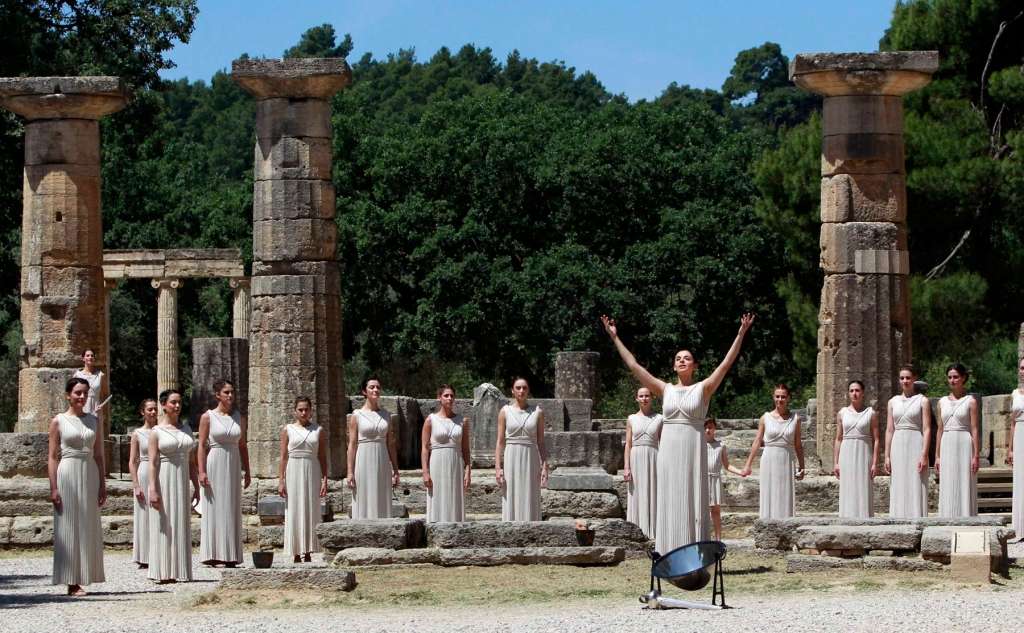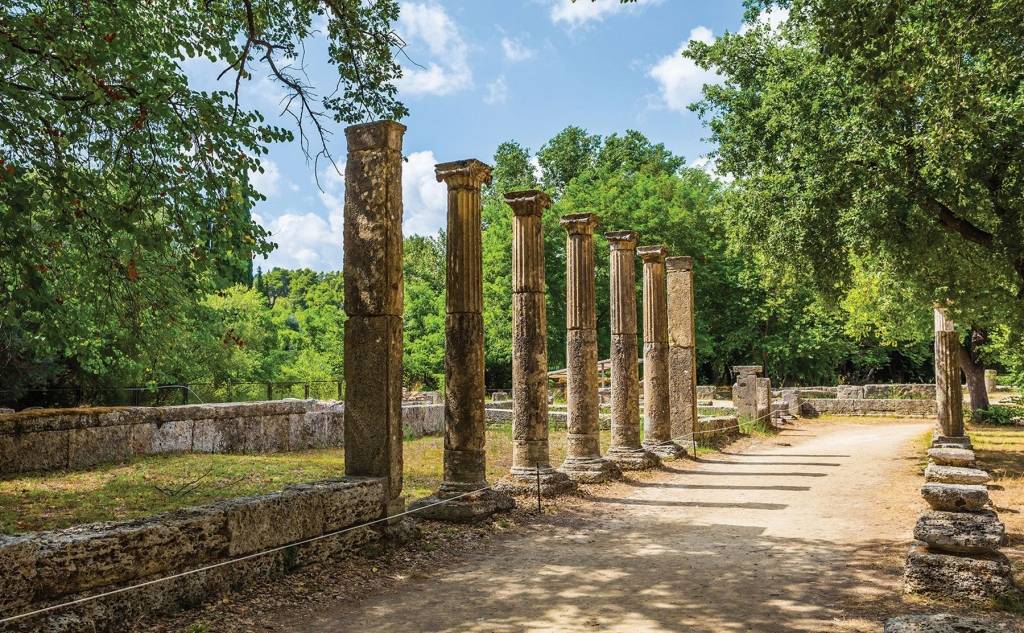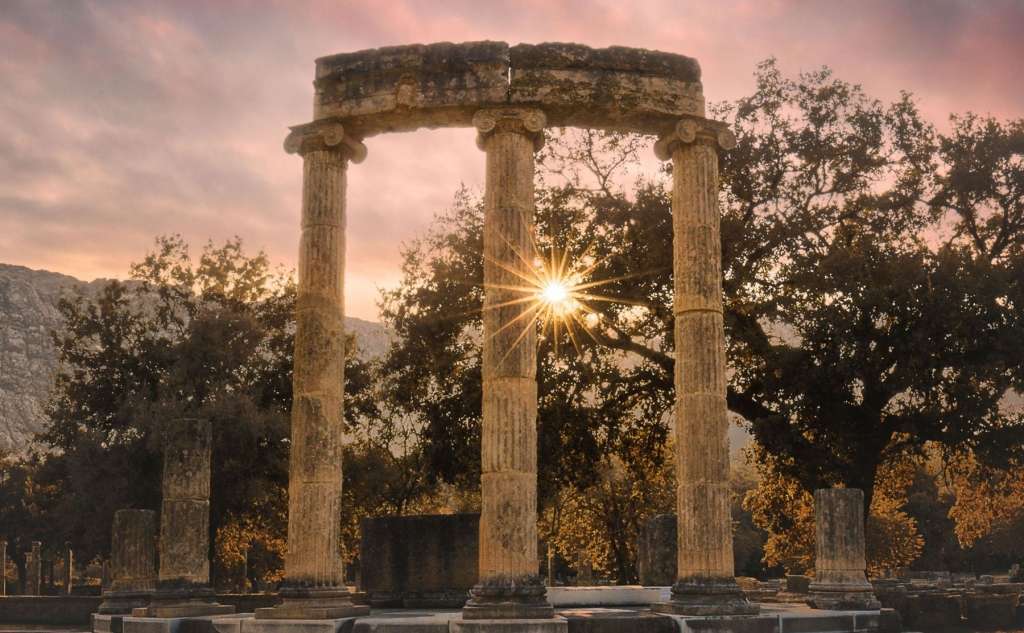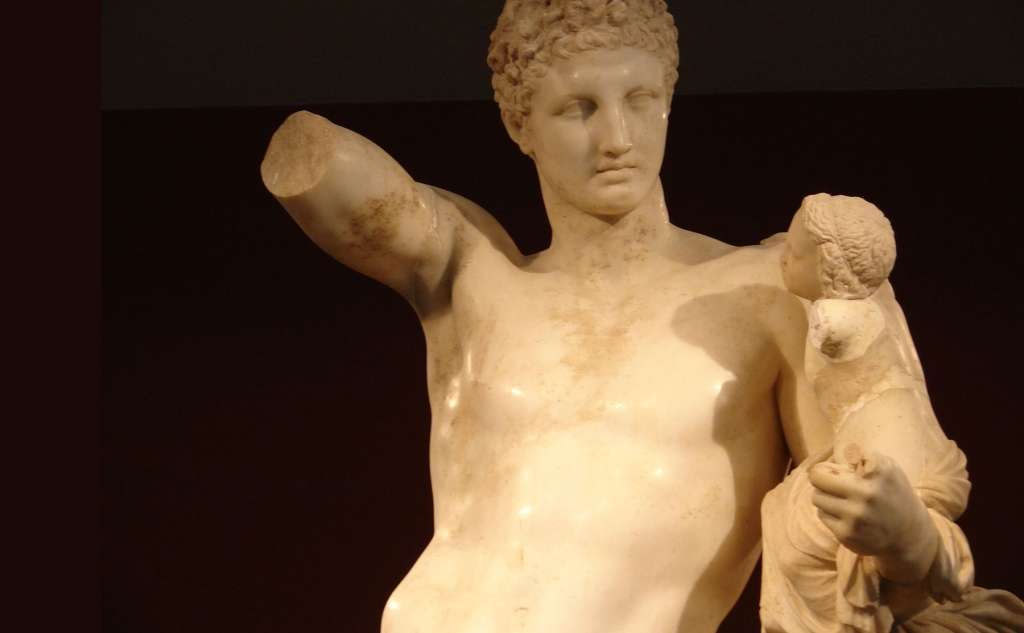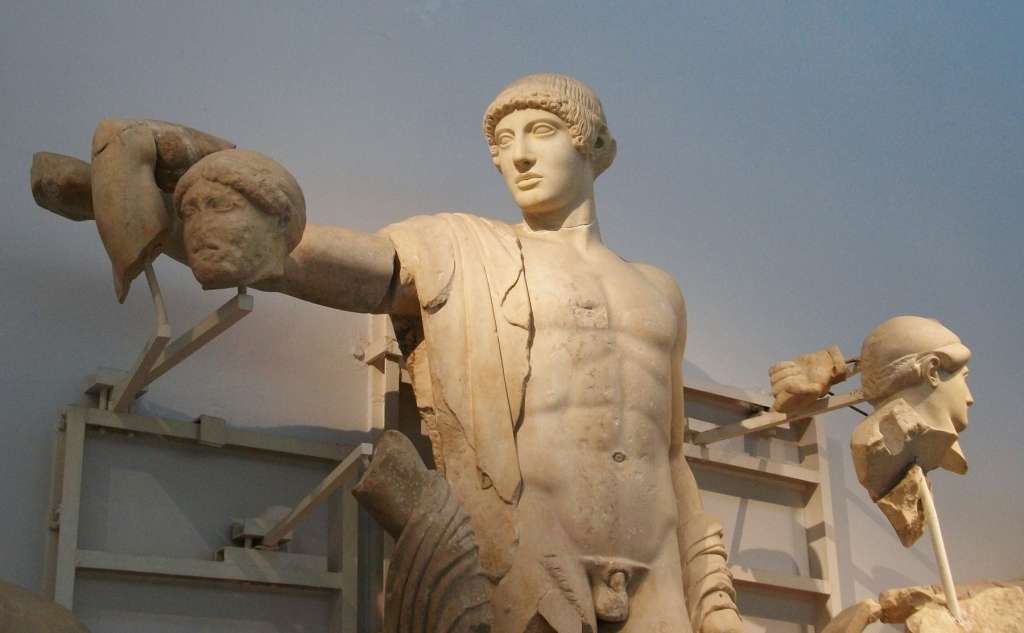Ancient Olympia
Highlights
The ancient stadium where you can perform a running race
The mysticism of the place
Hermes of Praxiteles (which is considered the most beautiful statue ever sculpted)
The pediments of the temple in the museum
The weapons and armors that were dedicated to the sanctuary
GET IN TOUCH
Spread the word


In the western Peloponnese, in the beautiful valley of the Alfeios river, the most glorious sanctuary of ancient Greece dedicated to the father of the Gods, Zeus, flourished.
It spreads to the southwestern foothills of the verdant Kronion hill, between the rivers Alfeios and Cladeos, which unite in this area. Despite its secluded location near the western coast of the Peloponnese, Olympia was established in the ancient world as the most important religious and sports centre. Here, the most important games of ancient Greece took place, the Olympic Games, which were held every four years in honour of Zeus, an institution with panhellenic appeal and glamour from ancient times up to the present day. The beginning of the worship and the mythical competitions that took place in Olympia is lost in the depths of time. The local myths about the mighty king of the region, the famous Pelops (from which the Peloponnese is named) and the river God Alfios reveal the strong bonds of the sanctuary with both the East and the West.
According to the ancient tradition, in the 11th century BC, the Aetolians, led by Oxylos, who founded the state of Ilida, settled down in the broader area of Olympia. Towards the end of the Mycenaean era, the oldest primitive sanctuary, probably dedicated to local and panhellenic deities, was probably formed.
Around the 10th-9th century B.C. Altis, the sacred grove that was full of wild olive trees, pines, plane trees, poplars and oaks, began to form. Then the worship of Zeus was established, and Olympia, from a place of habitation, became a place of worship.
In 776 BC., the games were reorganised in honour of Zeus by Iphitos, the king of Ilida, Clehosthen of Pisa and Lykourgos of Sparta, who established the holly truce. Olympia was held every four years and soon acquired a panhellenic character.
The magnificent temple of Zeus, which housed one of the seven wonders of the ancient world, the golden ivory statue of the father of the Gods, was built at the peak of the golden age of antiquity to be destroyed by two great earthquakes in the sixth century AD. and having endured the destruction that all the sanctuary suffered during the times of Theodosius II.
Today, the archaeological site of Olympia still exudes sacredness and mysticism, and thousands of visitors come to visit the Alpheus valley daily to wander in the past, a past that still impresses everyone today.
In 1766, ancient Olympia was discovered by the Englishman Richard Chandler. However, no excavations were carried out by him. The first excavation at the site was carried out in 1829 by the French Scientific Expedition to the Peloponnese, known as the "Scientific Expedition of Moria", led by General J. Maison. Initially, most of the buildings were invisible because they had been covered by a thick layer of sediments (due to the overflows of the Alpheus and Kladeos rivers). Characteristically, only a sizeable Doric column section was visible. French archaeologists discovered parts of the metopes of the pronaos (the space enclosed by a portico) and opisthodome (the rear part of an ancient Greek temple) of the temple of Zeus, which they transported to France, with the permission of the Greek government of Ioannis Kapodistrias. To this day, these findings are exhibited in the Louvre Museum in Paris.
The first major excavation in Olympia began in 1875, financed by the German state and headed by archaeologist Ernst Curtius, where 14,000 objects were recorded. Today, alongside the excavation, maintenance and restoration works are being carried out on the site.
In the archaeological site of Olympia, visitors can see, among others, the following monuments:
The Temple of Zeus: The magnificent temple of Zeus was built between 470-456 BC. and is a model specimen of the Doric style. The temple was built by architect Livonas, and the main structure of the building was of local limestone coated with a thin layer of mortar. The gables were decorated with the Lapiths and Centaurs’ Race to the west and the Pelops and Oenomaus’ Chariot Race to the east. Today, the sculptures of the pediments are in the Archaeological Museum of Olympia. It is a typical Doric pavilion temple with six columns on each narrow side and 13 columns on each long side. The temple was double. Its nave, in other words, is divided into a pronaos, the central nave and a back building. The temple of Zeus is the largest temple in the Peloponnese.
Τhe chryselephantine statue of Zeus - one of the Seven Wonders of the ancient world was kept inside the temple. The statue of Zeus seated on his throne was about 13 metres high and was crafted by sculptor Phidias. The sculpture took him about twelve years to complete. On Zeus' head, a wreath of olive branches was placed, while in his right hand, he held the winged goddess Nike, made of ivory and gold. In his left hand, he had a sceptre made of many kinds of metals. Zeus' tunic and sandals were made of gold, while the throne was decorated with gold, precious stones, ebony (a type of wood) and ivory.
After the abolition of the Olympic Games, the statue was moved to Constantinople, where it was destroyed by fire around 475 AD.
Heraion of Olympia: The temple of Hera is located within the sacred area of Altea, built at the southern foothills of Kronius hill. It is a Doric pavilion temple where the lower part was made of shell stone, and the upper part of the walls was made of rough bricks. According to traveller Pausanias (5.17.1), there were cult statues of Zeus and Hera at the bottom of the nave, on a pedestal. During Roman times, the temple was turned into a museum. In the Heraion of Olympia, the most valuable works of the sanctuary, such as the famous Hermes of Praxiteles, the disk of the sacred truce, and the statues of the Hours by sculptor Emilos, etc., were kept. The altar of Hera, on which the Olympic flame is touched from the front, can be seen in front of the temple.
The Ancient Stadium: The stadium is located to the east of the sanctuary of Zeus and was the site of many of the sporting events of the Olympic Games, as well as the women's games, the Heraion. The stadium (192.27 metres long and 28 metres wide) has a capacity of 45,000 spectators. Stands were never built in the stadium, and the spectators sat on the ground. Few seats were available only for the officials. At the end of the 3rd century BC, the monumental entrance to the stadium, the so-called "Crypt", was built.
Bouleuterion: The Bouleuterion is located south of the temple of Zeus, outside the sacred precinct of Altea and is directly related to the holding of the Olympic Games. It was the seat of the Parliament of Ilia, whose members were responsible for the organisation of the games, probably also the Ellanodikes, the judges of the games. The building consists of two elongated arched parts connected by a square structure and an Ionic portico in their eastern part. Today, only the foundations of the monument remain.
Rectory: The Rectory was one of the most important buildings in Olympia since it was the centre of the sanctuary's administrative and political life and the Olympic Games' administrative centre. It is located inside the sacred precinct, next to the entrance to Alteas. Traveller Pausanias (5.15.8) mentions it as "Prytaneum of Ilia". Its construction dates back to the end of the 6th or the beginning of the 5th century BC. The building is square, and in the middle of its south side, there is an entrance leading to a square room in the centre. Here, the sacred hearth of the House of Ilia, where the "lime fire" burned, is also located. Also, inside the Rectory (to the right of the entrance), there was an altar dedicated to the god Pana.
Phidias' Laboratory: Phidias's laboratory is located directly across from the Temple of Zeus, west of Alteas. Here, the great sculptor created the golden ivory statue of the god. The laboratory, with a rectangular oblong floor plan (32.18 metres long and 14.50 metres wide), was built in the second half of the 5th century BC, while, later, it was turned into a place of worship. The workshop was constructed of shell stone, and its interior was divided into three aisles by two rows of columns. The golden ivory statue was set up in the central aisle. One of the most important findings of the laboratory is a small dark-coloured wine jar, on the base of which the inscription "FEIDIO EIMI", which means "I belong to Pheidias", is engraved. In the 5th AD century, a wood-roofed, three-aisled Early Christian Basilica was built on the ruins of the workshop.
At this point, a reference should be made to the Archaeological Museum of Olympia, one of the most important in Greece, where the archaeological findings found in the archaeological site of Olympia are exhibited. The museum is also known as the "New Museum" to distinguish it from the older one.
The Archaeological Museum of Olympia consists of twelve rooms organised thematically and chronologically. The collection of bronze objects is one of the most important collections worldwide, while the prominent pottery findings are also significant. The museum also has storage areas, as well as workshops for conserving clay, bronze and stone objects, mosaics and minor findings. The museum’s central exhibit is the Hermes of Praxiteles, the cup that belonged to Phidias and the Victory (Nike) of Mendaeus Paionius. The Hermes of Praxiteles - the marble complex depicting the god Hermes holding the little Dionysus - is the work of sculptor Praxiteles and was found intact inside the temple of Hera during the excavations of 1877. The sculptural composition, 2.13 metres high, is from Parian marble and is a masterpiece of the 4th century BC. art representing an era where strict symmetry had been succeeded by naturalism in rendering forms.


